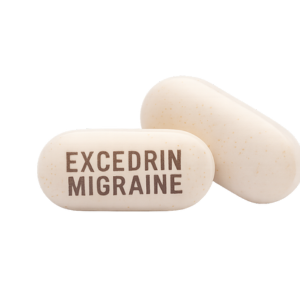
Excedrin Migraine
Caffeine
130 mg
Note: Caffeine amounts are based on the standard Excedrin Migraine formula (acetaminophen 250 mg, aspirin 250 mg, caffeine 65 mg per tablet). A typical dose of 2 tablets equals about the caffeine in a medium cup of coffee.
| Attribute | Value |
|---|---|
| Caffeine Level | Moderate |
| Serving Size | 2 tablets |
| Caffeine | 130 mg |
| Calories | 0–5 kcal |
| Sugar | 0 g |
| Caffeine per Tablet | 65 mg |
Excedrin Migraine is one of the most widely used over‑the‑counter (OTC) medications for migraine relief. Its effectiveness comes from a combination of three active ingredients — acetaminophen, aspirin, and caffeine — that work together to target pain quickly and efficiently.
What Is Excedrin Migraine?
Excedrin Migraine is an FDA‑approved OTC medication specifically formulated to relieve migraine headaches. Unlike general pain relievers, it combines multiple active ingredients to address both pain and migraine‑related symptoms.
Key features of Excedrin Migraine include:
- Migraine‑Specific Relief – Approved by the FDA for treating migraine pain.
- Fast‑Acting Formula – Can begin working within 30 minutes for some users.
- Combination Therapy – Uses three active ingredients for a synergistic effect.
- OTC Availability – Accessible without a prescription.
- Clinically Studied – Proven effective in multiple placebo‑controlled trials.
Together, these qualities make Excedrin Migraine a go‑to option for many migraine sufferers seeking quick relief.
Key Ingredients in Excedrin Migraine
The strength of Excedrin Migraine lies in its three‑ingredient formula, each playing a distinct role in pain management.
- Acetaminophen (250 mg) – Reduces pain signals in the brain and lowers fever.
- Aspirin (250 mg) – A nonsteroidal anti‑inflammatory drug (NSAID) that reduces pain and inflammation.
- Caffeine (65 mg) – A stimulant that enhances the effectiveness of acetaminophen and aspirin.
This combination is more effective for migraine relief than any of the ingredients taken alone.
How Much Caffeine Is in Each Tablet?
Caffeine is a defining component of Excedrin Migraine, boosting the pain‑relieving effects of the other ingredients.
- Per Tablet – 65 mg of caffeine.
- Typical Adult Dose – 2 tablets (130 mg caffeine total).
- Comparison – Roughly equal to the caffeine in an 8–12 oz cup of brewed coffee.
- Maximum Dose – Do not exceed 2 tablets in 24 hours unless directed by a doctor.
This caffeine content is considered moderate, enough to enhance pain relief but still within safe daily limits for most adults.
Caffeine in Excedrin vs. Coffee and Other Drinks
Many people wonder how Excedrin’s caffeine compares to everyday beverages. Here’s a quick breakdown:
- Excedrin Migraine (2 tablets) – 130 mg caffeine.
- Brewed Coffee (8 oz) – 95 mg caffeine (varies 80–200 mg).
- Espresso (1 oz) – 63 mg caffeine.
- Black Tea (8 oz) – 40–50 mg caffeine.
- Red Bull (8.4 oz can) – 80 mg caffeine.
In short, a standard dose of Excedrin Migraine delivers about the same caffeine as a medium cup of coffee, making it important to monitor additional caffeine intake from drinks or foods.
Why Caffeine Is Added to Pain Relievers
Caffeine isn’t just an energy booster — it plays a direct role in pain relief when combined with analgesics.
- Enhances Effectiveness – Increases the absorption and potency of acetaminophen and aspirin.
- Vasoconstriction – Narrows dilated blood vessels in the brain, a common cause of migraine pain.
- Faster Onset – Helps the medication work more quickly.
- Improved Relief – Studies show caffeine can increase pain relief by 40% when paired with analgesics.
- Lower Doses Needed – Allows smaller amounts of pain relievers to be effective.
This is why caffeine is a common additive in many headache and migraine medications.
Potential Side Effects of Caffeine in Excedrin
While caffeine improves effectiveness, it can also cause side effects, especially if combined with other caffeine sources.
- Nervousness or Jitters – Common with higher caffeine intake.
- Insomnia – Taking Excedrin late in the day may disrupt sleep.
- Rapid Heartbeat – Some users may experience palpitations.
- Stomach Irritation – Caffeine and aspirin together may upset the stomach.
- Rebound Headaches – Overuse can lead to medication‑overuse headaches.
For most adults, the caffeine in Excedrin Migraine is safe when used as directed. However, those sensitive to caffeine or with certain health conditions should consult a doctor before use.
